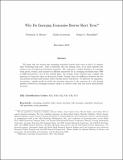Why Do Emerging Economies Borrow Short Term?
Author(s)
Broner, Fernando A.; Lorenzoni, Guido; Schmukler, Sergio L.
DownloadLorenzoni_Why do.pdf (1.093Mb)
OPEN_ACCESS_POLICY
Open Access Policy
Creative Commons Attribution-Noncommercial-Share Alike
Terms of use
Metadata
Show full item recordAbstract
We argue that one reason why emerging economies borrow short term is that it is cheaper
than borrowing long term. This is especially the case during crises, as in these episodes the
relative cost of long-term borrowing increases. We construct a unique database of sovereign
bond prices, returns, and issuances at different maturities for 11 emerging economies from 1990
to 2009 and present a set of new stylized facts. On average, these countries pay a higher risk
premium on long-term than on short-term bonds. During crises, the difference between the two
risk premia increases and issuance shifts towards shorter maturities. To illustrate our argument,
we present a simple model in which the maturity structure is the outcome of a risk sharing
problem between an emerging economy subject to rollover crises and risk averse international
investors.
Date issued
2010-12Department
Massachusetts Institute of Technology. Department of EconomicsJournal
Journal of the European Economic Association
Publisher
MIT Press for the European Economic Association
Citation
Broner, Fernando A., Guido Lorenzoni and Sergio L. Schmukler. "Why Do Emerging Economies Borrow Short Term?." forthcoming in the Journal of the European Economic Association
Version: Author's final manuscript
ISSN
1542-4766
1542-4774